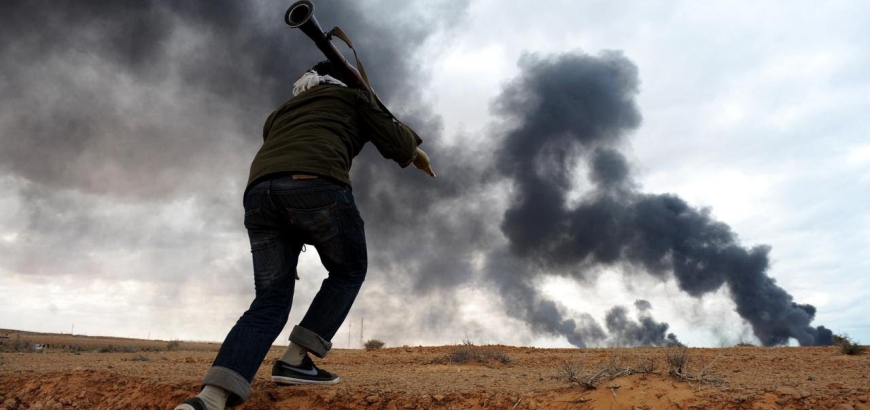The name of the city of Manbij in the northeastern Aleppo countryside in northern Syria has assumed significance in Syrian, regional and international scenes since it became a point of conflict between Turkish-backed Free Syrian Army groups leading the Euphrates Shield operation on one hand, and Assad forces and PKK-affiliated Kurdish Deomacratic Union Party (PYD) forces on the other.
Both the Syrian regime and the Kurdish militias are working to prevent the advance of the Euphrates Shield forces toward Manbij after Turkish-backed opposition groups took control of the city of Al-Bab east of Aleppo, following long and ferocious fighting with Islamic State (ISIS).
The Euphrates Shield forces are trying to take control of Manbij because it is the gateway to the city of Raqqa in eastern Syria, ISIS’ de facto capital since 2014.
A few days ago, the Manbij Military Council, which is affiliated with the Kurdish-led Syrian Democratic Forces, announced it was surrendering to regime forces the line of contact with the Euphrates Shield forces west of Manbij. This was confirmed by Russia, Assad’s political and military ally.
Manbij is located in northern Syria, about 90 kilometers to the northeast of Aleppo city, 35 kilometers from the Turkish border and 40 kilometers from the Euphrates River to the west.
The city is about 100 square kilometers while its population, according to 2014 statistics, is about 60,000 people. Most of them are Arabs, at about 90 percent, with other groups, such as Kurds, Turkmen and Circassians, who have coexisted peacefully with each other throughout history.
Manbij, the second biggest city of Aleppo province, has endured much of the turmoil which has embroiled Syria since the outbreak of the March 2011 popular demonstrations against the Assad regime, in which Manbij also took part.
Syrian opposition forces took control of the city on July 17, 2012. Following that, the city was governed by its residents through a local council and served as a successful example for the regions under Syrian opposition control.
This state of affairs continued until March 2013, when the city was targeted by an ISIS ideological campaign and later fell under its military control in January of 2014. This marked a turning point in altering the face of the city and surrounding region, which had welcomed thousands of families fleeing from the Syrian regime’s shelling.
Kurdish militias
More than a year after ISIS took control of Manbij, SDF militias launched an operation on the city on May 31, 2015, backed by the U.S.-led international coalition’s massive air and land support.
The Kurdish militias’ aim was to connect the eastern and western banks of the Euphrates River and impose their influence upon them. They hoped to subsequently gain control over an area extending along the Turkish-Syrian border from the northern Syria's Hassakeh province to the east to Manbij in the west, and then advance in the northern Aleppo countryside up to Afrin.
In fact, these Kurdish-led forces did manage to take control of Manbij in August 2016. However, Turkey’s Euphrates Shield operation, launched in the same month, seized broad swaths of the northern and eastern Aleppo countryside in order to secure the Syrian-Turkish border, obstructing the Kurdish militia’s plans and derailing its advance toward Afrin.
Despite U.S. assurances to Turkey that the Kurdish militia fighters would leave Manbij after expelling ISIS from the city, these promises were never implemented. Thousands of fighters remain deployed in Manbij and its countryside under U.S. protection.
These forces, which have increased in number recently and have stationed themselves along the line of contact with FSA groups, are apparently joining other groups working to prevent the advance of Euphrates Shield forces toward the city.
Since taking control of Manbij, Kurdish militias have taken a series of steps to consolidate their presence in the city. They have made claims of delivering the Manbij administration to Arabs, while retaining de facto control of the city.
The militias have also raised the American flag in some parts of Manbij to suggest the presence of U.S. forces in the city and thereby protect themselves against possible attacks. They have also issued ID cards sealed with their stamp and distributed them to Manbij residents, a step toward legitimizing their presence in the city, which they took over by force of arms.
According to FSA leaders from Manbij, the city will be important in the coming battle toward ISIS' main base in Raqqa.
Colonel Haytham al-Asafi, leader of the 51st Brigade, one of the FSA divisions participating in Euphrates Shield, said: “The entry to Raqqa is through one of just two directions — either from Tal Abyad or from Manbij. There is a third route from Deir Hafer but it is under ISIS control. This will force us to move in areas under control of the Syrian regime.”
This article was translated and edited by The Syrian Observer. Responsibility for the information and views set out in this article lies entirely with the author.


